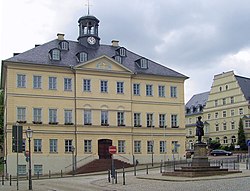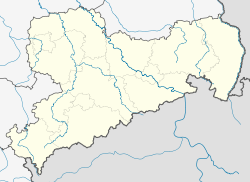Hainichen, Saxony
Hainichen | |
|---|---|
 Hainichen town hall | |
Location of Hainichen within Mittelsachsen district  | |
| Coordinates: 50°58′11″N 13°7′31″E / 50.96972°N 13.12528°E | |
| Country | Germany |
| State | Saxony |
| District | Mittelsachsen |
| Government | |
| • Mayor (2018–25) | Dieter Greysinger[1] (SPD) |
| Area | |
• Total | 51.57 km2 (19.91 sq mi) |
| Elevation | 304 m (997 ft) |
| Population (2022-12-31)[2] | |
• Total | 8,448 |
| • Density | 160/km2 (420/sq mi) |
| Time zone | UTC+01:00 (CET) |
| • Summer (DST) | UTC+02:00 (CEST) |
| Postal codes | 09661 |
| Dialling codes | 037207 |
| Vehicle registration | FG, BED, DL, FLÖ, HC, MW, RL |
| Website | www.hainichen.de |
Hainichen is a market town in Saxony, Germany. It is located on the river Kleine Striegis and about 15 miles (24 kilometres) north-east of Chemnitz. Hainichen has been shaped by its industrial past.
History
[edit]From the foundation until industrial revolution
[edit]A first settlement had been mentioned in 1276 as villa forensis Heynichen.
Hainichen used to be a place of considerable industry. Its primary manufacture was once that of flannels, baize, and similar fabrics; at the time it may have been called the centre of this industry in Germany.[3]
On April 23, 1800, a F5/TORRO10 tornado devastated Arnsdorf, Dittersdorf and Etzdorf, near Hainichen. Despite its strength, there were no deaths.[4]
The Gellert institution for the poor was established in 1815.[3]
In 1933, a production plant for small delivery vans and minibuses called Framo moved from nearby Frankenberg to Hainichen. Since then, the automotive industry has been the most important employer.
Nazi era
[edit]An early concentration camp, Hainichen concentration camp, was established in April 1933 and dissolute in June 1933. During World War II, a subcamp of Flossenbürg concentration camp was located here, housing female prisoners working for the Framo enterprise.[5]
GDR
[edit]The former plant of the Framo company was nationalized. The 1960s saw a reingeneering of delivery vans and minibuses under the Barkas B1000 brand. Hainichen became a major producer of parts for these cars.
After reunification
[edit]Production of the B1000 delivery vans and minibuses ceased in 1991.
Population statistics
[edit]Source:[6]
Typical for a market town in the east of Germany, Hainichen faces the demographic problem of a steadily declining population.
| Year | Population |
|---|---|
| 1834 | 4,623 |
| 1933 | 8,047 |
| 1960 | 11,188 |
| 1998 | 10,405 |
| 1999 | 10,266 |
| Year | Population |
|---|---|
| 2000 | 10,061 |
| 2001 | 9,888 |
| 2002 | 9,744 |
| 2003 | 9,628 |
| 2004 | 9,554 |
| Year | Population |
|---|---|
| 2005 | 9,502 |
| 2008 | 9,131 |
| 2010 | 8,876 |
| 2012 | 8,714 |

Leisure and tourism
[edit]Sites and buildings of interest
[edit]Hainichen is home of a camera obscura.
Other important sights are the Gellert museum (literature museum), Tuchmacherhaus (clothier museum) and a communal park. Hainichen is surrounded by the beautiful valleys of the river Striegis.
Sports
[edit]Hainichen has a communal sports centre with a small indoor pool, a communal outdoor swimming pool and a bowling centre. Also, there is a cycling track nearby.
Industry
[edit]Hainichen is characterised by small and medium-sized businesses. The largest employer is the car parts maker Metalsa Automotive Hainichen GmbH (formerly ISE Industries Hainichen GmbH) (429 employees in 2005).
Districts
[edit]Areas of the city include
- Bockendorf,
- Cunnersdorf,
- Eulendorf,
- Gersdorf,
- Falkenau,
- Riechberg,
- Siegfried,
- Schlegel and
- Berthelsdorf.
International relations
[edit]Hainichen is twinned with:
Famous citizens
[edit]

- Hainichen is the birthplace of Christian Fürchtegott Gellert (1715–1769), to whose memory a bronze statue was erected in the marketplace in 1865. He was an important poet of the Enlightenment.
- Friedrich Gottlob Keller (1816–1895), the inventor of the groundwood pulp technique, was born in Hainichen.
More sons and daughters of the town
[edit]- Rainer Simon (born 1941), film director and screenwriter
- Konrad Zdarsa (born 1944), Bishop of the Diocese of Augsburg
References
[edit]- ^ Bürgermeisterwahlen 2018, Freistaat Sachsen, accessed 10 July 2021.
- ^ "Einwohnerzahlen nach Gemeinden als Excel-Arbeitsmappe" (XLS) (in German). Statistisches Landesamt des Freistaates Sachsen. 2024.
- ^ a b Chisholm, Hugh, ed. (1911). . Encyclopædia Britannica. Vol. 12 (11th ed.). Cambridge University Press. p. 822.
- ^ "Tornado in Hainichen am 23.04.1800". tornadoliste.de. Retrieved 2022-07-28.
- ^ Christine O'Keefe. Concentration Camps
- ^ Source from 1998 onwards: Statistical office of Saxony Numbers from 1960 onwards per 31 December.
- ^ "List of Twin Towns in the Ruhr District" (PDF). Twins2010.com. Archived from the original (PDF) on 2021-02-25. Retrieved 2009-10-28.



